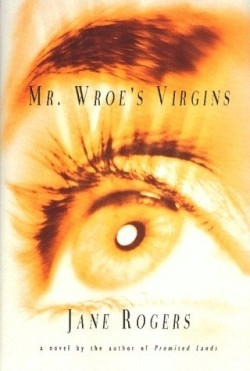Mr. Wroe's Virgins
In 1830, in Lancashire, England, prophet John Wroe obtained from his congregation seven women, purportedly virgins, to provide him comfort and household assistance. Jane Rogers’ fictionalized account of the ensuing events is woven from the conflicting motives, ideas, beliefs and passions of those involved. This is dramatic material, with a vein of rich and subtle humor.
Rogers, who has four previously published novels, tells her tale in the voices of four of the seven women. Leah, secretly the mother of a baby boy fathered by a departed soldier, seeks to seduce Wroe in order to banish the other six women and rule the household. Joanna, called Saint Joanna by the others and pious enough to gladly serve God and Wroe, is an able administrator who immediately becomes the household supervisor. Hannah is a non-believer, intelligent and idealistic, with connections to the labor and utopian movements that are the secular counterparts to Wroe’s millennialist religion.
Finally, there is Martha, mute and dumb from a brutal childhood. Rogers portrays her in passages of modified stream of consciousness in which the interior monologue is punctuated by exterior voices so readers can see through Martha’s eyes but process the information independently of her: “(N)oises of things with voices. Hooting, crashing, sprinkling, spraying and sounds like gales breaking trees. I see men doing it. “Hush, Sister Martha,” Joanna tells me. “The musicians are playing…”
Wroe, a properly enigmatic villain, is silent with most of the women but engages Hannah in talk about her secular activities and her idealistic beliefs in the possibility of a better world. He becomes increasingly open to her and jokes wearily about one of the church Elders: “He would dispatch us all to hell, if he could, and reign alone himself with God.”
When Wroe visits Joanna’s bedchamber, the scene has the same dank darkness that was present when Dostoevsky’s Grand Inquisitor visited his prisoner’s jail cell. For those who wish to tap it, there is humor here: “With our bodies, we Thee worship,” Wroe says. He tells Joanna their sexual union will return them to innocence even as they conceive the next child of God. Saint Joanna is gratified at the idea of bearing His child but shocked at the “angry leaping rod of purple flesh so terrible in its aspect” by which the deed is to be done.
Disaster, as prophesized by Wroe himself, arrives on schedule. Some faiths are shattered, some are transformed and some are affirmed. The American poet Robert Lowell wrote of “all these settings out/beginning in wisdom, ending in doubt.” Rogers has plumbed the process and found things of value.
Reviewed by
Rich Wertz
Disclosure: This article is not an endorsement, but a review. The publisher of this book provided free copies of the book to have their book reviewed by a professional reviewer. No fee was paid by the publisher for this review. Foreword Reviews only recommends books that we love. Foreword Magazine, Inc. is disclosing this in accordance with the Federal Trade Commission’s 16 CFR, Part 255.

